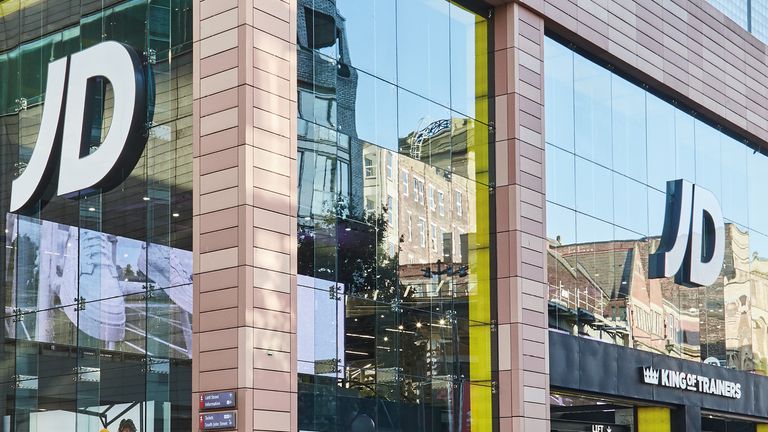
JD Sports has reacted angrily after a final ruling from the competition watchdog that it must sell the Footasylum chain bought for £90m in 2019.
The Competition and Markets Authority (CMA) revealed its decision following a protracted investigation that saw JD appeal an original finding that it must offload the sportswear brand over fears it could lead to a worse deal for shoppers.
JD said on Thursday that the latest ruling “defied logic” and it was considering its options.
The CMA had been ordered to look at the issue again after criticism from a competition appeals tribunal that it had failed to take the impact of the COVID-19 pandemic into account – shifting consumer purchases online and even direct from manufacturers.
The regulator said: “Over the course of its inquiry, the CMA found that JD Sports is by far and away the closest alternative for shoppers at Footasylum.
“The CMA expects this will continue to be the case even after taking into account the continued growth in online shopping, including on the websites and apps of brands such as Nike and Adidas.”
It cited the findings of online shopper surveys as further evidence that people would go to JD if they were unable to shop at Footasylum for clothing.
Investigators added that they believed Footasylum would remain in robust health even if no longer owned by JD Sports.
Kip Meek, chair of the CMA inquiry group, said: “The UK boasts a thriving sports fashion market and today’s decision reflects our commitment to keeping it that way.
“We strongly believe shoppers could suffer if Footasylum stopped having to compete with JD Sports. It is likely they would pay more for less choice, worse service and lower quality.
“The pandemic may have altered the way we shop but innovative businesses, driven by healthy competition, will rise to the challenge and successfully cater to changing tastes and habits.
“The evidence we have analysed shows that JD Sports and Footasylum are adapting well to market conditions and would continue to be profitable should the merger not go ahead.”
Peter Cowgill, JD’s executive chairman, responded: “The CMA rightly concludes that, following the acquisition of Footasylum, JD would have no incentive to raise prices or worsen its offer as its most important competitors are the DTC (direct to consumer) operations of the international brands themselves.
“However, the CMA has then somehow concluded that the competitive threat from DTC does not extend to Footasylum and that JD would have an incentive to worsen the offer in Footasylum to the detriment of both consumers and suppliers.
“We would suggest that the CMA is in a minority of one in reaching this conclusion.
“Overall, the CMA’s decision today continues to be inexplicable to anyone who understands what difference the pandemic has made to UK retail and how competition and the supply chain in our markets actually work.
“It is deeply troubling at a time when the UK high street has been seriously damaged already and is vulnerable to further closures.”







More Stories
Unlock Your Journey to Intelligent Wealth Management
Inspiring Change: Michael Bates Path to Entrepreneurship and Giving Back
Climate Token YES WORLD is now available for trading on top crypto change LaToken